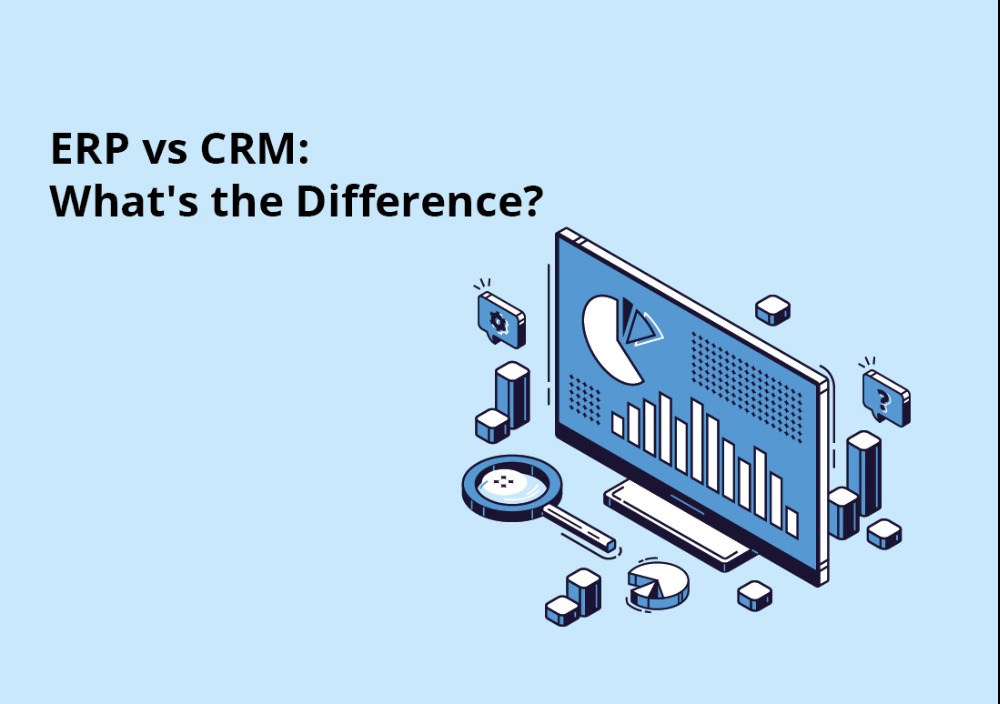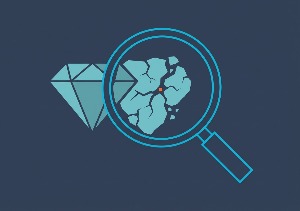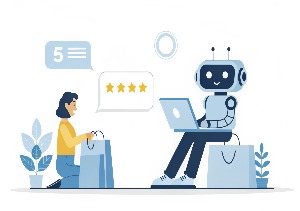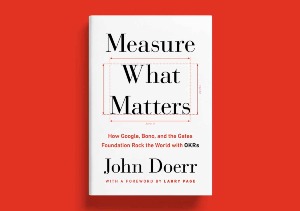Enterprise resource planning and customer relationship management systems are frequently confused. Both solutions are aimed at business process automation, so some people believe that they’re similar to such an extent that they can be interchangeable in many cases. But, actually, ERPs’ functionality isn’t the same as it is in CRMs. While some of their features may overlap, there is never the choice of whether a company should build an ERP or CRM - the two systems targeted at completely different business cases.
This article defines what ERP and CRM systems are and explains how to choose the right solution based on your organization’s needs.
What is CRM?
A customer relationship management (CRM) system is designed to manage core processes related to the company’s interactions with its current and potential customers. Initially, CRM software was focused exclusively on sales force automation and was used mainly by sales departments. But, today, CRMs cover practically all touchpoints between a business and a customer, including those not directly falling into a sales process. The user base of these systems has expanded as well. Now, it includes not only sales reps but also marketing and customer support teams.
The exact CRM feature-set depends on many factors, for example, the company’s industry and business needs, a system’s vendor and customization options (if it’s not custom software), etc. But the most typical CRM functions include:
- gathering, processing, and storing customer data (incl., information about leads and prospects)
- managing customer database
- organizing and managing customer service (e.g., call center)
- tracking customer interactions with a business
- managing sales pipeline processes
- qualifying leads and tracking them through a sales funnel
- automating marketing campaigns (incl., email marketing and online advertising)
If a CRM system is equipped with analytical tools, it can also assist business managers in analyzing customers’ purchasing patterns, making sales forecasts, and identifying new business opportunities. All these features help organizations improve customer experience and, ultimately, increase sales.
What is ERP?
An enterprise resource planning (ERP) system has a much broader scope than CRM software. It collects data across the entire organization and streamlines business processes for all departments, not just those handling customer interactions. While ERP software may include some units that manage customer relationships, its functionality is never limited only to CRM functions.
Being the most comprehensive type of business solution, an ERP system covers all aspects of the company’s day-to-day operations. Its feature set is always complex and comprises numerous modules, such as:
- financial management (i.e., financial reporting, payroll, accounts payable, accounts receivable, the general ledger)
- supply chain management (incl., product procurement or manufacturing, delivery planning, and logistics)
- warehouse and inventory management
- human resources (HR) management (incl., hiring, onboarding, talent nurturing, KPIs tracking, managing employee life cycle)
- customer relationship management
- order processing and management
By implementing an ERP system, a company gets an all-in-one management platform that consolidates all information collected by its departments in one place. What’s more, ERP solutions make such information standardized, manageable, and shareable. This brings a variety of benefits to an entire organization. But the most important advantage is that business executives receive an overview of what happens in a company in real-time, which allows them to make data-backed decisions.
Key differences between ERP and CRM
As mentioned, ERP and CRM systems have certain similarities. Both of them help businesses reduce the amount of manual work and streamline processes. Like with a CRM, ERP’s main goal is to increase the company’s profits with improved optimization and better use of data. However, all these things are very generic. When diving into specifics, you can see that many characteristics separate CRM and ERP. Here are the most vital of them:
Scope and functionality
In the ERP/CRM comparison, the former one wins in the category of versatility. ERP systems comprise features that cover a wide range of business activities, from finances to HR. Meanwhile, CRMs focus exclusively on customer relationships. ERP software may contain CRM components, but it’s never vise versa.
Ways to increase profitability
ERP software increases profitability mainly by cutting the company’s costs, while CRM systems are targeted at closing a higher number of deals. Of course, this criterion can not always be clearly defined. For example, if an ERP solution has an embedded CRM module, it will also facilitate the increase in sales. On the other hand, most CRM systems reduce operational expenses by automating some processes. But it’s more about the general principle of work, not the strict demarcation line.
Businesses that use a system
The lists of businesses that need CRM and ERP systems are not identical. CRM software can be used by any company that sells products or services to customers and doesn’t want to store all data in spreadsheets. Even if you run a small or mid-size e-commerce store, implementing a basic CRM solution might be a good idea. The situation with ERP software is much more complicated. These solutions are complex and expensive. That’s why businesses start using them only when they have the established processes and clear objectives.
ERP vs CRM: when to choose each business solution
The above CRM versus ERP comparison has probably given you a general idea of when to use each of these systems. But let’s summarize the key points to make it even clearer to you.
The main thing that you should take into account is your company’s business needs. What is the key issue that you’re trying to solve by implementing the new software? If it’s related only to the management of customer interactions and the number of closed transactions, then a CRM system is the option that will fit your business better. In case you’re looking for a more fundamental platform that will bring all the organization’s core processes, including customer relationships, under one roof, you should probably consider building an ERP.
Another aspect that you need to understand about CRM vs ERP development is that most mature businesses need both systems. But there is no single sequence in which they have to be implemented.
Sometimes, a company is happy with using an off-the-shelf CRM and wants to develop a custom ERP to automate the rest of the processes. In this case, a development team can integrate the two solutions. Other businesses create custom CRMs in the first place, and these systems grow into ERPs over time as more features are added to them. It also happens that ERP software comes first, while a CRM module is included later. Everything depends on your business goals and digital strategy.
Conclusion
While ERP and CRM systems may have some common features, they must be viewed as separate business solutions. To decide what software your organization needs, you should explore its current demands, pain points, bottlenecks, and objectives. Flexi IT has vast experience in providing web development services to businesses of different sizes and industries. So if you need professional help, just drop us a line.






